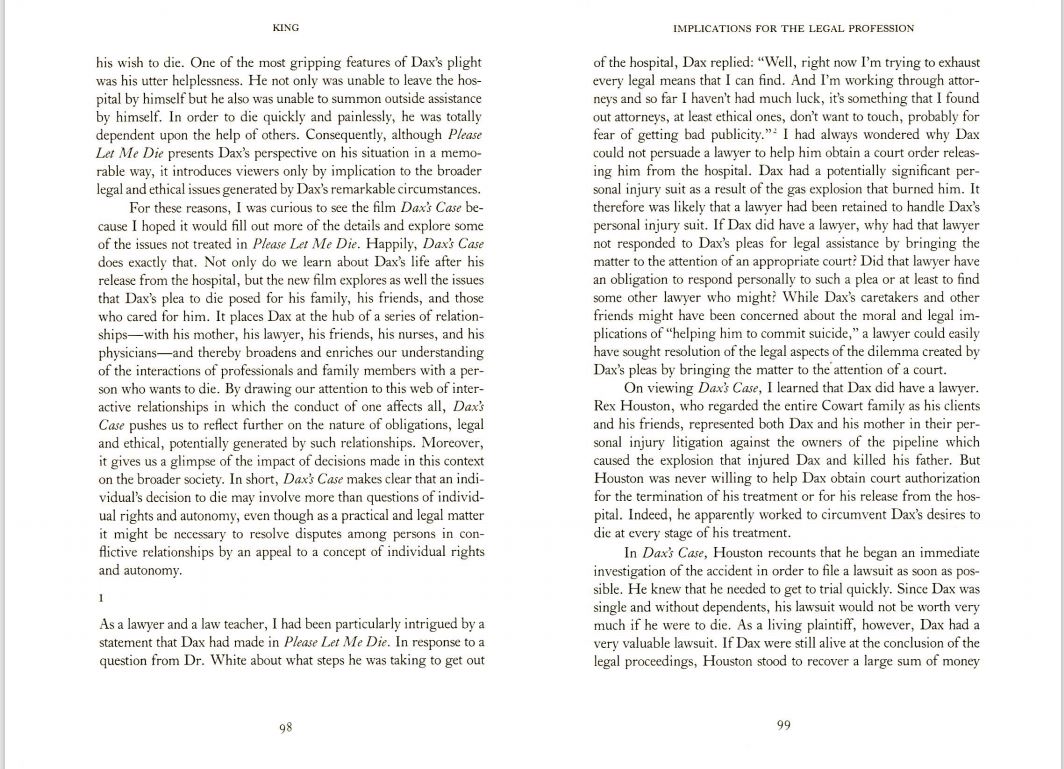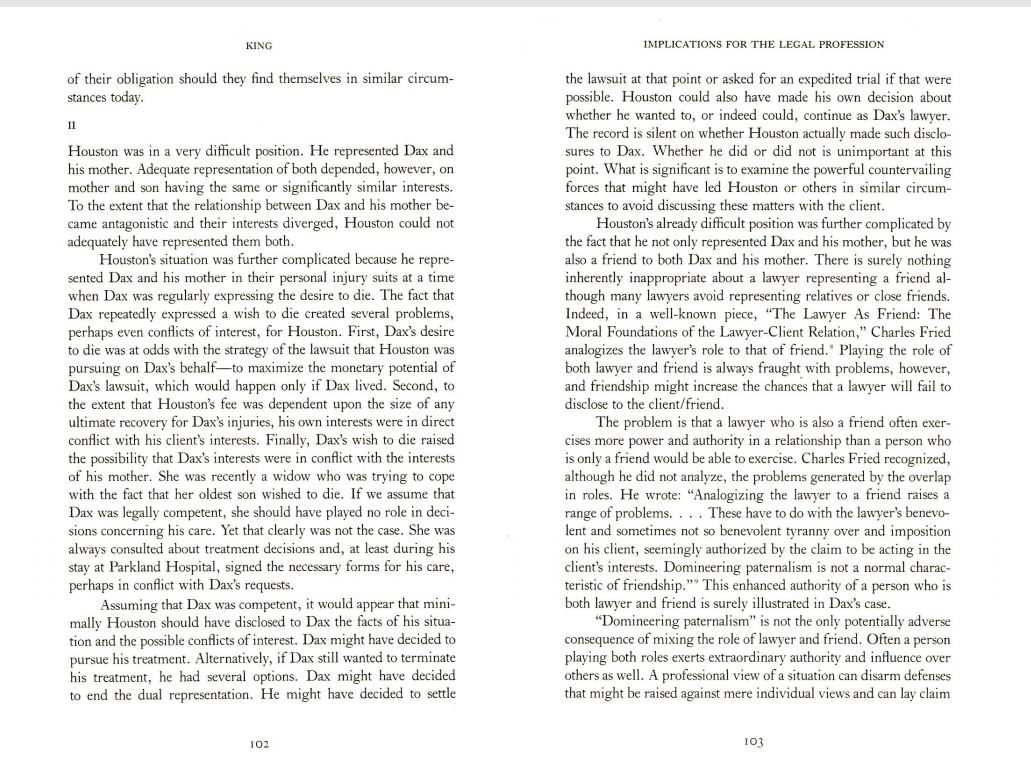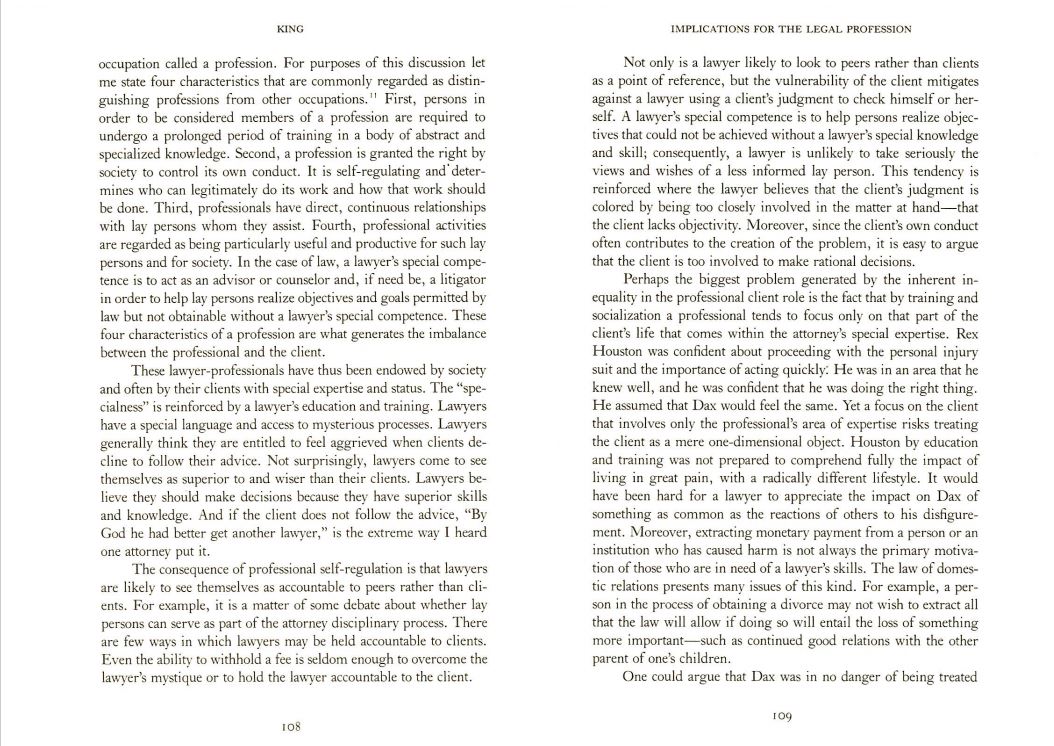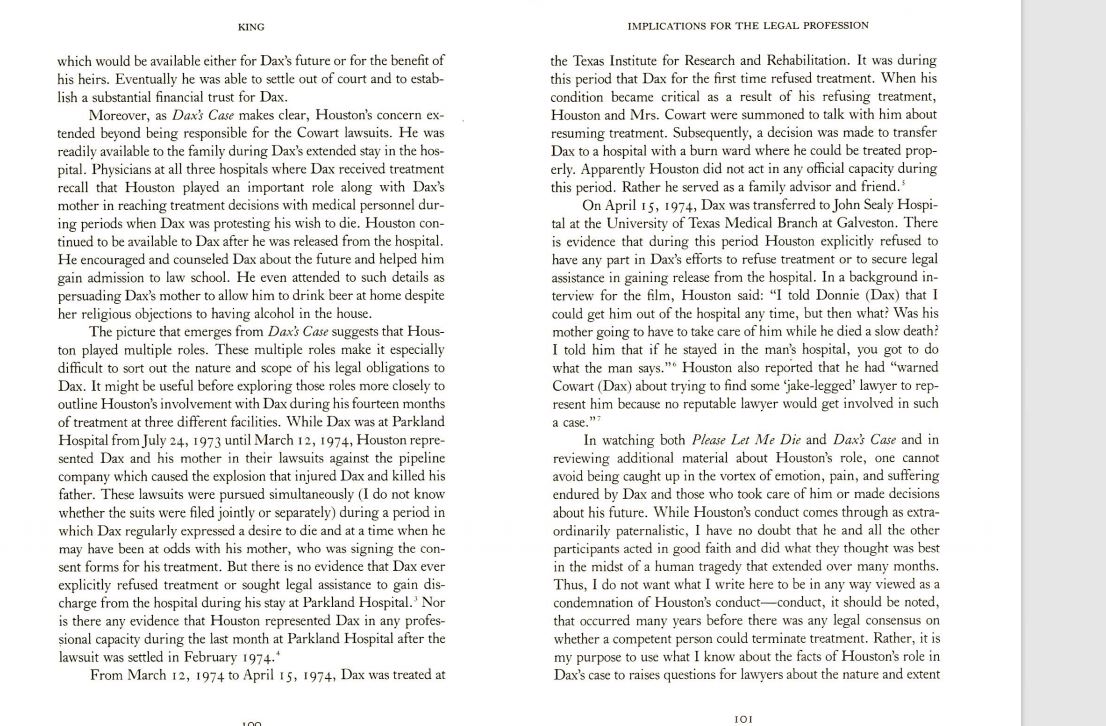Can I pleased get help explain how in Dax case study Divine Command Theory was used by his attorney(Rex Houston) when it came to Dax not wanting to live. Please see case study attach.
KING his wish to die. One of the most gripping Features of Dax's plight was his utter helplessness. He not only was unable to leave the hos pital by himself but he also was unable to summon outside assistance by himself. In order to die quickly and painlessly, he was totally dependent upon the help of others. Consequently, although Please Let M'e Die presents Dan's perspective on his situation in a memo- rable way, it introduces viewers only by implication to the broader legal and ediical issues generated by Dani's remarkable ci rcumslances. For these reasons, I was corious to see the Film Dex} Cm be~ cause I hoped it would ll out more of the details and explore some ofthe issues not treated in Pirate Let Me Die. Happily, Dex} Care does exactly that. Not only do we learn about Dax's life after his release from the hospital, but the new lm explores as well the issues that Dax's plea to die posed for his family, his friends. and those who cared for him. It places Dex at the hub ofa series of relation shipswith his mother. his lawyer, his friends, his nurses, and his physiciansand thereby broadens and enriches our understanding of the interactions of professionals and Family members with a per- son who wants to die. 3y drawing our attention so this web of inter~ active relationships in which the conduct of one affects all, Dos-It Cm pushes us to reect further on the nature of obligations, legal and ethical, potentially generated by such relationships. Moreover. it gives us a glimpse of the impact of decisions made in this context on the broader society. In short. Box} Case makes clear that an indi- vidual's decision to die may involve more than questions of individ- ual tights and autonomy, even though as a practical and legal matter it might be necessary to resolve disputes among persons in con ictive relationships by an appeal to a concept of individual rights and autonomy. 1 As a lawyer and a law teacher, I had been particularly intrigued by a statement that Dan: had made in PleaseLerM'e Die. In response to a question From Dr. White about what steps he was taking to get out IMPLICATIONS FOR THE LEGAL PROFESSION oft-he hospital, Dex replied: \"Well, right now .I'm trying to exhaust every legal means that I can nd. And I'm working through attor neys and so Far I haven't had much luck, it's something that I found out attorneys. at least ethical ones, don't want to touch, probably for fear of getting bad publicity."1 I had always wondered why Dex could not persuade a lawyer to help him obtain a court order releas- ing him from the hospital. Dex had a potentially signicant peri- smal injury suit as a result of the gas explosion that burned him. It therefore was likely that a lawyer had been retained to handle Dax's personal injury suit. If Dax did have a lawyer, why had that lawyer not responded to Dax's pleas for legal assistance by bringing the matter to the attention of an appropriate courti Did that lawyer have an obligation to respond personally to such a plea or at least to nd same other lawyer who might? While Dax's caretakers and other Friends might have been concerned about die moral and legal im~ plications of \"helping him to commit suicide,\" a lawyer could easily have sought resolution ofth-e legal aspects ol'the dilemma created by Dax's pleas by bringing the matter to thc'attention of a court. On viewing Dari" Case, I learned that Dax did have a lawyer. Rex Houston, who regarded the entire Cowart Family as his clients and his friends. represented both Bax and his mother in their per- sonal injury litigation against the owners of the pipeline which caused the explosion d'iat injured Bax and killed his father. But Houston was never willing to help Dax obtain court authorization for die termination of his treatment or for his release from the hos pital. Indeed. he apparently worked to circumvent Dax's desires to die at every stage of his treatment. In Dex? Care. Houston reoounts that he began an immediate investigation of the accident in order to le a lawsuit as soon as pos- sible. He knew that he needed to get to trial quickly. Since Dax was single and without dependents, his lawsuit would not be worth very much if he were to die, As a living plaintiff. however. Datt had a very valuable lawsuit. lfDax were still alive at the conclusion ofthe legal proceedings, Houston stood to recover a large sum of money 99 KING of their obligation should they nd diemselm in similar circum stances today. Houston was in a very diicult position. He represented D33: and his mother. Adequate representation of both depended, however, on mother and son having the same or signicantly similar interests. To the extent that the relationship between Bax and his mother he came antagonistic and their interests diverged, Houston could not adequately have represented them both. Houston's situation was Further complicated because he repre sented Dex and his rno'ier in their personal injury suits at a. time when Dan was regularly mtpressing the desire to die. The fact that Dan repeatedly expressed a wish to die created several problems, perhaps even conflicts of interest, for Houston. First, Dan's desire to die was at odds with the strategy of the lawsuit dint Houston was pursuing on Dax's behalfto maximize the monetary potential of Dax's lawsuit, Which would happen only iFDaJt lived. Second, to the extent dist Houston's fee was dependent upon the size of any ultimate recovery For Dax's injuries, his own interests were in direct conict with his client's interests. Finally, Dan's wish to die raised the possibility that Dante interests were in conict with the interests of his mother. She was recently a widow who was trying to cope with the fact that her oldest son wished to die. If we assume that Dex was legally competent, she should have played no role in deci- sious concerning his care. Yet dint clmrly was not the case. She has always consulted about treatment decisions and, at least during his stay at Parkland Hospital. signed the lieutenant}r forms for his care, perhaps in conict with Dax's requests. Assuming that Dan was competent, it would appear that mini- mally Houston should have disclosed to Dex the facts of his situa- tion and the possible conicts of interest. Dax might have decided to pursue his treatment. Alternatively, if Dax still wanted to terminate his treatment, he had several options. Dax might have decided to end the dual representation. He might have decided to settle [02 IMPLICATIONS EUR THE LEGAL PROFESSION the lawsuit at that point or asked for an expedited trial if that were possible. Houston could also have made his own decision about whether he wanted to, or indeed could. continue as Dax's lawyer. The record is silent on whether Houston actually made such disclo- sures to Dax. Whether he did or did not is unimportant at this point. What is signicant is to examine the powerFul countervailing forces that might have led Houston or od'icrs in similar circum- stances to avoid discussing these matters with the client. Hormone already difcult position was further complicated by the Fact that he not only represented Dex and his mother, but he was also a friend to both Dex and his mother. There is surely nothing inherently inappropriate about a lawyer representing a friend al though many Iawyers avoid representing relatives or close friends. Indeed. in a wellknown piece, \"The Lawyer As Friend: The Moral Foundations of the LawyerClient Relation," Charles Fried analogizes the lawyer's role to that of friend.\" Playing the role of both lawyer and friend is always fraught with problems, however, and friendship might increase the chances dtat a lawyer will Fail to disclose to the cliendfriend. The problem is that a lawyer who is also a friend often ener- cises more power and audiority in a relationship than a person who is only a friend \"mlcl heahle to exercise. Charles Fried recognized, although he did not analyze, the problems generated by the overlap in holes. He wrote: "Analogizing the lawyer to a friend raises a range of problems. . . . These have to do with the lawyer's benevo- lent and sometimes not so benevolent tyranny over and. imposition on his client, seemingly authorized by the claim to be acting in the client's interests. Domineering paternalism is not a normal charac- teristic of friendship. \"' This enhanced authority ofa person who is both lawyer and friend is surely illustrated in Dan's case. \"Domineering paternalism" is not the only potentially adverse consequence of mixing the role of lawyer and Friend. Often a person playing both roles exerts extraordinary authority and inuence over others as well. A professional view of a situation can disarm defenses that might be raised against mere individual views and can lay claim 1o3 KING occupation called a profession. For purposes of this discussion let me state four characteristics diet are commonly regarded as distin- guishing professions from other occupations." First, persons in order to be considered members of a profession are required In undergo a prolonged period of training in a body of abstract and specialized knowledge. Second, a profession is granted the right by society to control its own conduct. It is selfregulating and'deter mines who can legitimately do its work and how that work should be done. Third, professionals have direct. continuous relationships with lay persons whom they assist. Fourth, professional activities are regarded as being particularly useful and productive for such lay persons and for society. In the case of law, a lawyer's special compe tence is to act as an advisor or counselor and. if need be. a litigator in order to help lay persons realize objectives and goals permitted by law but not obtainable without a lawyer's special competence. These four characteristics ofa profession are what seam-ates the imbalance between the professional and the client. These lawyeruprofessionals have thus been endowed by society and often by their clien with special expertise and statute. The "spe- cialness" is reinforced by a lawyer's education and training. Lawyers have a special language and acted; to mysterious processes. Lawyers generally think they am: entitled to feel aggrieved when clients de cline to follow their advice. Not surprisingly, lawyers come to see themselves as superior to and wiser than their clients. Lawyers be lieve they should make decisions because they have superior skills and knowledge. And if the client does not follow the advice, "By God he had better get another lawyer,\" is the extreme way 1 hard one attorney put it. The consequence of professional self-regulation is that lawyer's are likely to see themselves as accountable to peers rather than cli- ents. For example, it is a matter of some debate about whether lay persons can serve as part of the attorney disciplinary process. There are few ways in which lawyers may be held accountable to clients. Even the ability to withhold a fee is seldom enough to overcome the lawyer's mystique or to hold the lawyer accountable to the client. IDS IMPLICATIONS FOR THE LEGAL PROFESSION Not only is a lawyer likely to look to peers rather than clients as a point of reference, but the vulnerability ofthe client mitigates against a lawyer using a client's judgment to check himself or her self. A lawer's Special competence is to help persons realize objec- tive: that could not be achieved without a lawyer's special knowledge and skill; consequently, a lawyer is unlikely to take seriously the views and wishes of a less informed lay person. This tendency is reinforced where the lawyer believes that the client's judgment is colored by being too closely involved in the matter at handthat the client lacks objectivity. Moreover, since the client's own conduct often contributes to the creation of the problem. it is easy to argue that the client is too involved to make rational decisions, Perhaps the biggest problem generated by the inherent in- equality in the professional client role is the fact that by training and socialization a professional tends to focus only on that part of the client's life that comes within the attorney's special expertise, Rex Houston was condent about proceeding with the personal injury suit and the importance ofacting quickl He \"'33 in an area that he ltnew well, and he was condent that he was doing the right thing. He assumed dist Dex would feel the same, Yet a focus on the client that involves only the professional's area of poi-rise risks treating the client as a mere one-dimensional object. Houston by education and training was not prepared to comprehend fully die impact of living in great: pain. With a radically different lifestyle. It would have been hard for a lawyer to appreciate the impact on Deal of something as common as the reactions of others to his disgure- ment. Moreover, extracting monetary payment From a person 01- an institution who has caused harm is not always the primary motiva- tion ofthose who are in need ofa lawyer's skills. The law ofdornes- tic relations presents many issues of this kind. For example, a per- son in the process of obtaining a divorce may not wish to extract all that the law will allow if doing so will entail the loss of something more importantsuch as continued good relations with the other parent of ones children. One could argue that Dex was in no danger of being treated [09 \f










